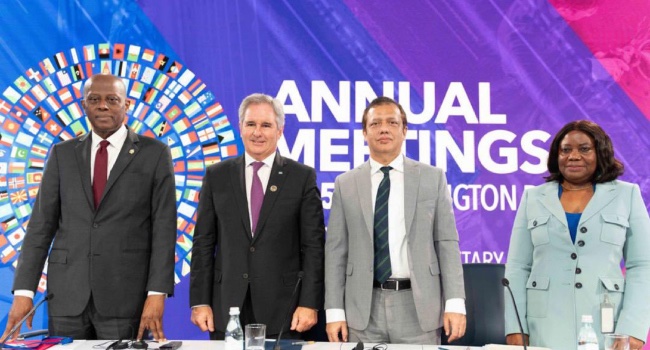
Nigeria Set To Take Over Chairmanship Of G-24 From Argentina In Historic Move

In a significant development that underscores Nigeria’s rising influence on the global economic stage, the country is set to officially assume the chairmanship of the Intergovernmental Group of Twenty-Four (G-24) on November 1, 2025, taking over from Argentina. The transition marks a defining moment for Africa’s largest economy as it steps into a leadership role within one of the world’s most critical forums for international monetary and development policy discussions.
The G-24, established in 1971, serves as a platform for developing nations to coordinate their positions on international monetary and financial issues, ensuring their voices are heard in global decision-making bodies such as the International Monetary Fund (IMF) and the World Bank. The group’s focus revolves around creating a fairer global financial system that addresses the unique challenges of developing economies, ranging from debt management to equitable access to financial resources. Nigeria’s assumption of the chairmanship therefore comes at a time when the global financial landscape is undergoing significant shifts, and developing nations are increasingly demanding a stronger say in shaping policies that directly affect their economies.
This transition was formally ratified during the G-24’s last plenary session in Washington, D.C., held on the sidelines of the 2025 IMF and World Bank Annual Meetings. Nigeria’s delegation, led by Minister of Finance and Coordinating Minister of the Economy, Wale Edun, played an active role in discussions that centered on global debt restructuring, sustainable development financing, and reforms to the Bretton Woods institutions. Following the announcement, international observers and analysts hailed Nigeria’s elevation as a positive development for the African continent and the Global South as a whole.
The chairmanship will give Nigeria the platform to shape conversations around issues that directly impact developing nations, including currency stability, capital flows, and the urgent need to reform the global financial architecture to better reflect modern economic realities. Experts believe that this position will also enable the country to push for greater African representation in key financial institutions and promote collaborative solutions to shared economic challenges.
Nigeria’s leadership in the G-24 could not have come at a more critical time. The world economy continues to grapple with the aftershocks of the COVID-19 pandemic, geopolitical tensions, inflationary pressures, and climate change impacts. Developing countries, in particular, have been hit hardest, facing rising debt burdens, shrinking fiscal space, and limited access to concessional financing. As chair, Nigeria is expected to champion innovative financial strategies that support sustainable economic recovery and inclusive growth across member nations.
According to sources within Nigeria’s Ministry of Finance, the administration of President Bola Ahmed Tinubu views this new role as an opportunity to further project Nigeria’s voice in international economic policy. The government is said to be prioritizing reforms aimed at strengthening the nation’s macroeconomic stability, diversifying revenue sources, and promoting foreign investment—goals that align closely with the G-24’s mission of fostering economic resilience among developing countries.
President Tinubu, known for his pro-market reforms and commitment to repositioning Nigeria as a global investment hub, is expected to leverage this position to deepen the country’s engagement with multilateral institutions and international partners. Analysts believe that Nigeria’s chairmanship could help boost investor confidence, attract more international partnerships, and reaffirm the country’s commitment to transparency and sound economic management.
The Intergovernmental Group of Twenty-Four currently comprises nations from Africa, Asia, and Latin America, representing a vital cross-section of the world’s emerging economies. As chair, Nigeria will lead efforts to enhance South-South cooperation, strengthen the collective bargaining power of developing countries, and ensure that global financial reforms address the systemic inequalities that have long disadvantaged the Global South.
Economic experts have emphasized that Nigeria’s new role will require deft diplomacy, strategic leadership, and a clear vision. While the country’s growing influence within international institutions is commendable, they note that translating this into tangible benefits for ordinary citizens will depend on how effectively the government aligns its domestic policies with its global advocacy. Nigeria’s leadership in the G-24 presents an opportunity to influence policies that can help attract concessional financing for infrastructure, energy transition, education, and technology—sectors critical to sustainable development.
Nigeria’s experience as a developing economy navigating multiple challenges—ranging from currency fluctuations to debt sustainability—positions it uniquely to understand and articulate the concerns of its fellow G-24 members. Its economic size, strategic location, and influence within Africa give it a natural leadership advantage. As the world’s eighth most populous nation and Africa’s top oil producer, Nigeria’s voice carries considerable weight in discussions on energy, trade, and global finance.
There is also an expectation that Nigeria will use its chairmanship to advocate for stronger regional economic cooperation within Africa. This aligns with ongoing continental efforts such as the African Continental Free Trade Area (AfCFTA), which aims to deepen economic integration and promote intra-African trade. Nigeria’s leadership of the G-24 could further amplify Africa’s call for fairer trade rules, debt relief initiatives, and greater access to technology transfer and investment capital.
Observers say this development could also help strengthen Nigeria’s foreign policy outlook, which has increasingly emphasized multilateralism and economic diplomacy under President Tinubu’s administration. The chairmanship provides a diplomatic platform for Nigeria to engage with leading global economies on more balanced terms while pushing for reforms that promote equity and shared prosperity.
As the November 1 handover date draws near, preparations are reportedly in full swing. Nigeria’s Ministry of Finance is said to be coordinating closely with the Central Bank of Nigeria (CBN) and other relevant agencies to ensure a smooth transition and to define clear policy priorities for its tenure. Among the key agenda items expected to dominate Nigeria’s chairmanship are debt sustainability, access to affordable development financing, climate adaptation funding, and digital financial inclusion.
Reactions to the news have been largely positive, with stakeholders describing it as a well-deserved recognition of Nigeria’s leadership potential. Economists have lauded the move as a chance for Nigeria to rebuild its international image and influence policy decisions that can foster economic transformation not just within its borders but across developing nations. Civil society groups, however, have called on the government to ensure that this opportunity translates into real policy outcomes that improve citizens’ welfare rather than remaining a symbolic diplomatic victory.
As Nigeria steps into this historic role, the world will be watching to see how Africa’s largest economy balances its domestic economic reform agenda with the expectations of global leadership. The chairmanship of the G-24 presents both a challenge and an opportunity—a chance for Nigeria to prove that it can not only lead conversations but also inspire collective action toward a more inclusive and resilient global economy.
With just weeks to go before the official handover from Argentina, anticipation is building both at home and abroad. For Nigeria, November 1, 2025, will not only mark the beginning of its tenure as chair of the G-24 but also a new chapter in its journey toward global economic prominence—a moment that could redefine its place in the international financial order and reaffirm its commitment to championing the interests of the developing world.


